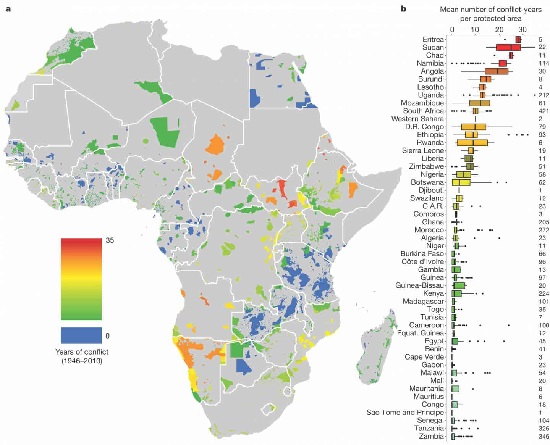
The 8th Ministerial Summit of Forum on China Africa Cooperation is smoothly underway in Senegal, Dakar. The summit has given due attention to one of the cooperation areas, eco-environment sector. Indeed, the environment and biodiversity sector is important area of cooperation for the developing continent Africa, as it is suffering a lot due to the global impact of climate change as well as lack of important science and technological advancement to protect its environment.
Recently, China National Forestry and Grassland Administration (NGFA) deputy administrator Peng Youdong said that in recent years, China has been cooperating with Africa in biodiversity conservation. As a result, it has been well developed.
“The Chinese government and private sector have provided funds, equipment, manpower, and technology to support African countries in the conservation of endangered species and habitats, and conducting capacity building training,” he added.
Ethiopian Biodiversity Institution Director Dr. Melese Mario told The Ethiopian Herald that it is true that developed countries including China have been helping the biodiversity conservation of developing countries including Ethiopia via various mechanisms.
“This is because supporting to conserve the untouched biodiversity of developing countries are very important for the current and future generation of this planet,” he said.
With a global population now above 7.6 billion people and projected to reach over 11 billion by 2100, humanity consumes significantly more resources than our planet can provide in the long term, and our patterns of consumption and the waste human produce cannot be absorbed by the world’s natural systems.
It is true that the use of natural resources is extending beyond regenerative capacities, or even more succinctly, the world has reached planetary limits. Along the process of human development, the protection of biodiversity and the demand for energy is very significant things that need attention.
Biodiversity denotes the variety of living species (plants, animals, and microorganisms) in their natural settings and the total of the related ecological processes. It is measured on three levels: genes, species, and ecosystem. Biodiversity is the key to human survival and development and has a direct bearing on our well-being. Humans must respect nature and follow its ways. We must conserve biodiversity to protect nature and live-in harmony with it.
In 1972, at the United Nations Conference on the Human Environment, the participant nations have signed the Declaration of the United Nations Conference on the Human Environment, which comprised the conservation of bio-resources in its 26 principles. In 1993, the Convention on Biological Diversity came into effect, which set three goals such as the conservation of biological diversity, the sustainable use of its components, and the fair and equitable sharing of the benefits arising out of the utilization of genetic resources, ushering in a new era for the protection of global biodiversity.
Along with the biodiversity conservation, clean and renewable energy development is also important for developing countries like Ethiopia since one has a direct or indirect influence on the other and vice versa. However, Africa has huge energy resources and potential far exceeding its current needs, but most of its people and productive sectors suffer from energy shortages. For instance, the case of electricity stands out: nearly two-thirds of the continent’s population do not have any access to electricity services.
Except for the Republic of South Africa, the entire generating capacity of the 47 countries of sub-Saharan Africa is less than that of the world energy demand. Hence, sub-Saharan Africa has the world’s lowest electricity access rate. Large parts of rural Africa including Ethiopia remain non-electrified and current generation capacity is often unable to meet demand in rapidly growing urban centers and peri-urban areas.
In order to meet the energy, the demand of their population, the nations in Africa have agreed to work together with several countries and stakeholders. Among others, Chain is one of the states which supports the protection of biodiversity and clean energy development of Africa which including Ethiopia.
According to Biodiversity Conservation in China the State Council Information Office, China has been supporting the conservation of biodiversity for various reasons. This includes harmony between humanity and nature, increasing the efficiency of biodiversity conservation, improving biodiversity governance, and further global cooperation on biodiversity conservation.
Apart from biodiversity conservation, China has been cooperating with Ethiopia via renewable energy development. According to a World Bank report, in Ethiopia, eight out of 10 citizens must resort to unhealthy lighting sources for basic daily activities like cooking or studying. These sources include kerosene lamps, wood fires, and expensive—but often unreliable—battery-powered appliances.
Cognizant of these facts, the government of Ethiopia has been working to have access to clean, inexpensive, renewable power to light homes and grow businesses. Minister of Water and Energy Minister Habtamu Itefa (Ph.D.) told local media recently that “our ten-year plan is designed in a way that will see us go from strength to strength. For example, in the energy sector for the next ten years, we are planning to reach an electricity coverage of 100 percent.”
It is true that Africa including Ethiopia has been working to meet the energy demand of their country. Besides, the aspiring to meet nearly a quarter of its energy needs from indigenous and clean renewable energy by 2030. But, the development of Africa’s energy sector would require more than the annual investment of 70 billion US dollars (USD) to 2030, resulting in carbon-dioxide emissions reductions of up to 310 megatons per annum. For this, the support of China is very crucial.
In fact, China has pledged to support 233 million US dollars to protect biodiversity in developing countries. This Expands collaboration in eco-environmental protection and jointly responding to climate change.
According to the Forum on China–Africa Cooperation (FOCAC), China has carried out South-South cooperation on tackling climate change, and to date has signed 15 cooperation agreements with 14 African countries. Various approaches have been explored in support of Africa’s response to the issue, such as implementing mitigation and adaptation programs, jointly setting up pilot low-carbon industrial parks, and conducting training in capacity-building. For example, the Ethiopian Remote Sensing Satellite-1, or ETRSS-1, launched with Chinese help, is one of the fruits of China’s first remote sensing satellite cooperation with Africa.
Apart from China cooperation, recently Japan Ambassador to Ethiopia Eto Takato said “Japan would like to work with Ethiopia on geothermal, wind power, water technologies, and energy sector. Furthermore, Denmark Ambassador to Kira Smith has also agreed to work together with Ethiopia in renewable energy.
According to Dr. Melese, the support which comes from developed countries, especially China in the form of mitigating climate change is very important to develop renewable energy and conserve the biodiversity of the country. It is particularly important to maintain cross-sectoral check and balance relations, to further create green legacy initiatives awareness, to discharge nation responsibility against climate change, to harmonize investment and infrastructural works with the protection of biodiversity.
BY EPHREM ANDARGACHEW
THE ETHIOPIAN HERALD DECEMBER 1/2021





